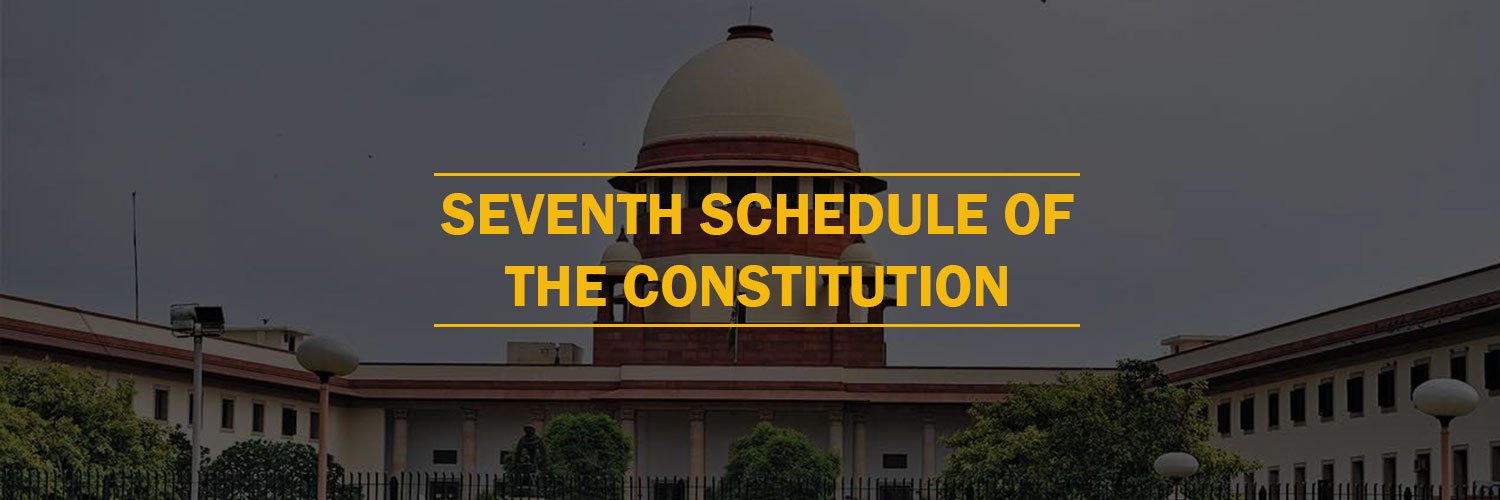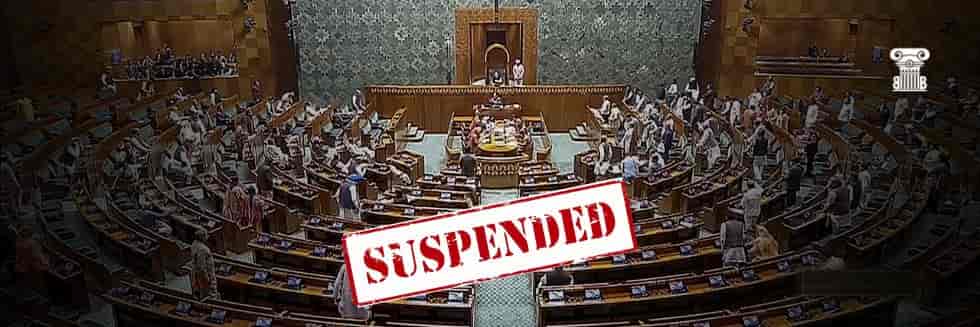SEVENTH SCHEDULE
The Constitution of India covers the list of areas to extent of which the State and Union Government can exercise their powers. It is covered in seventh schedule of Constitution of India. Hence, one level of government doesn’t interfere within areas of the other.
The Schedule is divided in three parts i.e. It has three lists which demarcates between different subject in which State and Union can interfere, namely;
List-1 Union List (Contains 97 Subjects)
List-2 State List (Contains 61 Subjects)
List-3 Concurrent List (Contains 47 Subjects)
This schedule is important in determining the relation of state and union. It is one of the various reasons which make our constitution, a quasi- federal constitution. A quasi – federal constitution means that it doesn’t gives too much power to either of the level of the government. It is often remarked about constitution of India that it is “a Federal Constitution with Unitary Bias”. The debate on the seventh schedule has reached a level since the Aam Aadmi Party’s Delhi government has been in clash of Lieutenant Governor (who comes under the ambit of the Union Government) reached the Supreme Court.
List-1 Union List
The Union List is the list of the subjects which is to be governed by the Parliament of India or Union Government. The State government can neither make laws nor interfere in any matters of these subjects. Only Union government can make laws, collect taxes, issue guidelines and performs other function relating to its governance in these areas. It, primarily, includes the areas like Defence, International Relations, Atomic Energy, Mining, Railways, Banking, Inter-state relations and Trade, Insurance, National Highway, Customs and Exports, any other matters not included in List-1 and List-2, etc.
The union government also has the power of delegating the legislative power on these subject matters as only parliament is unable to handle pressure the of the workload; hence, Legislative powers are delegated to various executives and government of official.
Some of the important subject matters of the Union List are:-
- Defence – The first seven entries of list of the constitution of India covers every aspect of defence which needs to be governed by the union government. The president, one of the organs of union government, is supreme commander in chief of all the armed forces including military, naval and air forces, under the supervision of Ministry of Defence. This list, also, gives power to Union government to take over industries which are eminent during time of the war or external aggression. The union government can also enforce special laws in area of internal disturbances; AFSPA is example of one such law.
- Diplomacy– The next most important subject given to the Union is the diplomacy and foreign relations; it means that it is the responsibility of the union government to take care of its relations with other countries and United Nations as well. It gives power to enter treaties and form alliances with other countries. Simply it gives authority the union government on every matter regarding foreign affairs like extradition, citizenship, emigration, etc.
- Railways– The union government holds every responsible regarding the matters related to the country’s Railway transportation. Union hold the expenditure and budget of the railways which is spent on the construction and expansion of the railways. Union also oversee the profits and loss of the railways.
- Mining– It also responsibility of the Union to oversee the process of Mining and various steps involved in process of Mining. The union needs to regulate the process of the mining and development of the mines/oilfields. The laws of labour involved in mines and oilfields also come under the powers of the Union Government.
- Financial Services– Various Financial services like Banking, Insurance, Public Debt is also under the scanner of the Union government, and it can form various Institutions for the financial services as well. Reserve Bank of India is one such example which has power of delegated legislations to make rules and regulations for the Banking sector.
- Inter-State Relations and Trade– The union can sometimes act as mediator between different states to resolves disputes and making of trade relations among them. It is duty of union to look out for states and make sure there is sufficient trade between both.
- Atomic Energy– One of the specialised areas given to union in development of Atomic Energy as it requires foreign deliberations as well. It is their duty to make sure their expansion of atomic energy as main source of energy rather than the thermal source
- Matters which are not listed anywhere in the List 2 and List 3– If any subject matter which has not been listed anywhere in schedule would fall under union list only. Union government will have all right to make the laws upon that matter. Space exploration is best instance for this subject matter.
List-2 State List
The State List of constitution of India contains the subject matter in which only state has power to legislate, regulate and develop. The power of the state to make law is limited as the Article 254 also puts a cap on its power as it makes laws made by states, repugnant if it is inconsistent with law made by parliament and parliament had Bona-fide authority to do so as per Union list or Concurrent list. The Parliament also has power to make laws in state list by virtue of article 249; under which if any law/legislation on subject of List-2 is made by Parliament it needs to passed by two-third of states of India as well. Therefore, List-2 contains the subjects which are majorly under control of States like Water, Agriculture, Public order, State Highways, Betting and Gambling, markets and fairs, Theatres, Estate, Intoxicating liquor etc. Originally, there were 66 subjects under List-2 but after 42nd amendment, 5 subjects were transferred to concurrent list. After Implementation of Goods and Service Tax Act (GST); Taxation on various items of this list became uniform throughout the country. Even though states had the power to implement the taxation but it was union which decided the tax percentage on each subjects as GST was ratified by two-third of states.
Some of the important subject matters of State List are:-
- Agriculture– The major function of the state government is to oversee the growth of agriculture in the state. It also means to carry out necessary research and advancement of the Agriculture.
- Water– Water is one of the major reasons of dispute between various states. Every state in India has power over water resources and their allocation, the creation of waterways and their path, ponds, canals, drainage, etc. Hence, Water is controlled by the state.
- Public Order– The armed forces of India- naval, military and air, have been excluded out the definition of Public order of the State List under seventh schedule; hence, it includes Police of that particular state which has responsible to maintain public order and it is controlled by the state government. Various functions of the police are maintained by state such as Deployment, admission of new officers, etc.
- Intoxicating liquor– The state has absolute control over intoxicating liquor in jurisdiction of state; the state controls the manufacturing, transportation, taxation and consumption of liquor. It gives power to the state to ban liquor as well; Gujarat and Bihar are good instance where state enforced liquor ban.
- Entertainment– The state also holds authority over forms of Entertainment like theatre, dramatic performances and cinema. It is state to decide whether to hold any event of entertainment, ban a movie, collecting entertainment taxes.
- Public Health– It is responsibility of state to look out for public health and sanitation. It is responsibility of state to facilitate the citizens with hospitals and dispensaries which will help them maintain their health.
List-3 Concurrent List
The concurrent list is the list where both union and state have power to make laws on that subject matter. It is a borrowed concept which our constitution makers borrowed from the Australian Constitution. It ensures that in those areas both the union and state share responsibility to make laws.
The Concurrent List is most controversial list when compared to above-mentioned list as often it would lead to direct clash between centre and state. Article 254 of constitution of India is clear language state in case of direct clash of state legislations and central legislations, the latter would prevail irrespective of the date they were passed. The state and union tend to negotiate sometimes about the terms of rules and regulations on Items of this list. The opposition on views of state and union tends to seek judicial opinion on the matters. Earlier taxes on various items of after 42nd amendment to the constitution of India, there 5 subjects which were moved from State List to Concurrent List namely- Education, Forests, Weights & Measures, Protection of Wild Animals and Birds and Administration of Justice.
Some of Important subject matters of List-3 are as follows:-
- Criminal Laws– The criminal laws are one of most important subject of List -3, however any definition of criminal laws under this subject shall not include any offence relating to areas specified by the List-1 and List-2 shall be taken care by only union and state respectively. This shall also include criminal procedure involve in offence. If any state wishes to amend Indian Penal Code or CRPC; they can bring state amendment which needs to be ratified by the Union later. Preventive detention for reasons connected with the security of a State, the maintenance of public order, or the maintenance of supplies and services essential to the community; persons subjected to such detention
- Education– It is also handled by the state and union together. It was brought by 42nd amendment in List-3 which leads to formation of various central education boards formulated by union government. This lead to a beginning of uniform system of Education throughout the country with CBSE becoming a pillar stone. It also includes vocational and technical training of labour as well. However it is subjected to the provisions of Entries 63, 64, 65 and 66 of List I.
- Trade and Commerce– It is necessary that both state and union coordinate for trade and commerce as it leads flourishing of economy of country. Under Entry 33 of list-3 Trade and commerce and also, production, supply and distribution of the products of any industry where the control of such industry by the Union is declared by Parliament by law to be expedient in the public interest, and imported goods of the same kind as such products, foodstuffs, including edible oilseedsand oils, cattle fodder, including oilcakes and other concentrates, raw cotton and cotton seed and raw jute.
- Civil Proceedings– It also a subject a matter in which union and state can make legislations regarding civil proceedings. It may include laws relating to family like Marriageand divorce; infants and minors; adoption; wills, intestacy and succession; joint family and partition, limitation and arbitration, Trade unions; industrial and labour disputes, etc.
- Social Problems– It is upon state and union to ensure of eradication of social problems which are leading into social evils. The function both the government is to control population, drugs, poison, unemployement and Adulteration with help of social and economic planning, family planning, price control, social security and social insurance.








